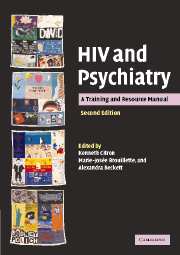Book contents
- Frontmatter
- Contents
- List of contributors
- Preface
- 1 Medical overview
- 2 Cognitive disorders in people living with HIV disease
- 3 General principles of pharmacotherapy for the patient with HIV infection
- 4 Mood disorders and psychosis in HIV
- 5 Suicidal behavior and HIV infection
- 6 Anxiety disorders and HIV disease
- 7 General issues in hospital HIV psychiatry
- 8 HIV and people with serious and persistent mental illness
- 9 Psychotherapy
- 10 HIV and substance use disorders
- 11 Psychiatric issues in pediatric HIV/AIDS
- 12 Uninfected children of parents with HIV
- 13 Psychological issues faced by gay men
- 14 Women and HIV
- 15 Couples
- 16A HIV and cultural diversity
- 16B African Americans
- 16C Latinos and HIV disease
- 16D One heart, two spirit, and beyond: HIV and the people of the First Nations
- 17 HIV in prison populations
- 18 Legal and ethical issues
- 19 Psychiatrist as caregiver
- Appendix I HIV Counselling checklist for physicians
- Index
- References
16B - African Americans
Published online by Cambridge University Press: 06 August 2009
- Frontmatter
- Contents
- List of contributors
- Preface
- 1 Medical overview
- 2 Cognitive disorders in people living with HIV disease
- 3 General principles of pharmacotherapy for the patient with HIV infection
- 4 Mood disorders and psychosis in HIV
- 5 Suicidal behavior and HIV infection
- 6 Anxiety disorders and HIV disease
- 7 General issues in hospital HIV psychiatry
- 8 HIV and people with serious and persistent mental illness
- 9 Psychotherapy
- 10 HIV and substance use disorders
- 11 Psychiatric issues in pediatric HIV/AIDS
- 12 Uninfected children of parents with HIV
- 13 Psychological issues faced by gay men
- 14 Women and HIV
- 15 Couples
- 16A HIV and cultural diversity
- 16B African Americans
- 16C Latinos and HIV disease
- 16D One heart, two spirit, and beyond: HIV and the people of the First Nations
- 17 HIV in prison populations
- 18 Legal and ethical issues
- 19 Psychiatrist as caregiver
- Appendix I HIV Counselling checklist for physicians
- Index
- References
Summary
Introduction
Although HIV first affected mainly white men in the USA, the number of cases in African Americans has increased steadily and dramatically. By 1996 in the USA, more cases of AIDS occurred in African Americans than in any other racial/ethnic population. In 1999, almost half the AIDS cases in the USA were African American and in 2001, African Americans accounted for 21 000, or 49%, of the more than 43 000 new adult AIDS cases reported (CDC Fact Sheet). In 2001, African American women accounted for nearly 64% of HIV cases reported in women (CDC Fact Sheet). African American children represent almost two-thirds of all reported pediatric cases (CDC, 2001a). AIDS is the leading cause of death among African American men ages 35–44 and African American women ages 25–34. AIDS is among the top three causes of death for African American men ages 25–54 and African American women ages 35–44 (CDC Fact Sheet). It has become such a serious issue that, in February 2001, there was a call for a Federal State of Emergency for African American Communities and HIV/AIDS.
When working with African Americans, clinicians should remember that they are not a monolithic group. Each person is an individual with his or her own experiences and beliefs. There is no simple model or explanation of community behavior. However, the concepts discussed in this chapter may play some role in patients' life experience and development.
- Type
- Chapter
- Information
- HIV and PsychiatryTraining and Resource Manual, pp. 253 - 262Publisher: Cambridge University PressPrint publication year: 2005



